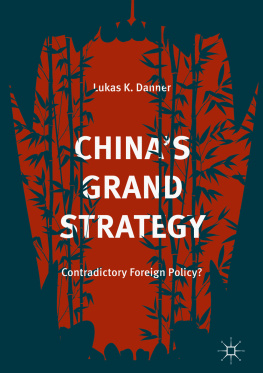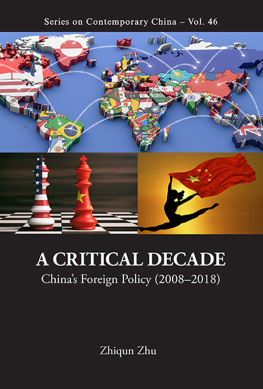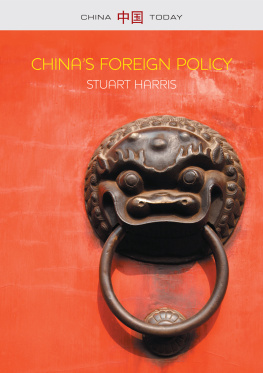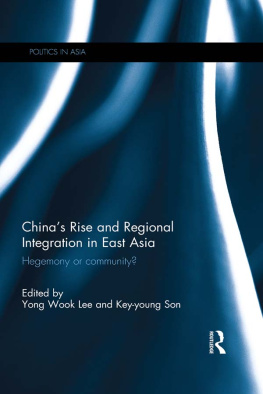1. Introduction
China has attracted much attention in the last decades with its perceived rise as a potential successor to the United States as the global hegemon . As history shows us, seldom has there been a great-power that rose without going to a major systemic war, like the rise of France and the Napoleonic Wars, the rise of Germany and World Wars I and II, or the rise of Japan and World War II. Because of this, Chinas rise is perceived to potentially endanger international peace, too. Since the prevailing perspective in these countries and in the United States is based, particularly, on Western-centric assumptions, world politics experts in these societies often assume that in its process of ascendancy, China will inevitably clash against its immediate regional neighbors as well as with other extra-regional great-powers. Such a belief is compounded by mixed signals coming out of China over the last decade, that is, incoherence of grand strategy , where official pronouncements indicate a China that views itself like a peripheral country, trying to accomplish sustained economic development and other policy goals that are inconsistent with those of a great-power and rising regional hegemon. Yet, often deeds signal Chinas desire to assert its leadership position in the region and in the world.
This ostensible contradiction has prompted a number of world politics experts to question whether this is a purposive, strategic ploy on the part of China to confuse other international actors. Thus, the argument remains that conclusions about Chinas inevitable violent (or possibly peaceful) rise and its apparent purposive, tactical contradistinction between words and deeds for strategic gains are exceedingly superficial and simplistic. They overlook Chinas long social, political, historical, and philosophical traditions.
It is important to keep in mind that despite Chinas current reemergence as a great-power, it is an actor with a long and rich history of hegemony, great-power competition, and rivalry.
This book problematizes the current practical and intellectual contradictions in Chinas grand strategy with its distinctive civilizational past and its very own ancient socio-political and philosophical ethos. In pursuing this analytical angle, I attempt to identify ideational, philosophical, idiosyncratic, cultural, historical, and religious tenets that may demonstrate ultimately if and how the origin of Chinas grand strategy may produce a different evolution and projection from the way that the grand strategy of Western powers has evolved and manifested itself over time.
Consistent with the line of inquiry explained above and on the basis of grand strategy theory, this book aims to establish and trace the Chinese understanding of honor in international relations history as far back as still relevant for current historical collective memory (ca. 100-plus years), and the attendant grand strategy manifestations. For this purpose, R. Ned Lebow s cultural motive of honor is fundamental. Thus, in what Thucydides already defined as the driving forces of international relations as fear , interest , and honor , this book focuses on honor as the most important factor in trying to explain the ambivalence in Chinas behavior ranging from peaceful to assertive.
The notion of grand strategy is at the core of the argumentation. The origin of this concept stems primarily from the history of the Western world. It is based largely on the experience of the European great-powers and the United States . Thus, it is imbued greatly by the Judeo-Christian tradition. Grand strategy can be defined as the general, long-term security and foreign policies of a territorial state. Grand strategy attends to the national interests of a state through the use of all means of statecraft available or at the disposal of a country, namely, economic, military, diplomatic, political, financial, and informational tools. While subscribing to the assumption that national interest always means security and survival of the nation-state in question, in Chinas case additionally, the national interest is assumed to entail the preservation of its territorial boundaries and integrity, recovering territory regarded as lost, gaining the international acceptance and recognition as the only legitimate government to represent China internationally, and improving its status on the world scale (Teufel Dreyer , p. 331).
To be clear, internal coherence of any nations grand strategy is defined here as the manner in which different policies within a grand strategy design support or undermine each other (Papasotiriou ; and second, China (as well as any other great or rising power) actually has a grand strategy . In short, I accept the existence of a longitudinal Chinese grand strategy .
By definition, grand strategy utilizes all tools of statecraft at the disposal of the nation-state to reach strategic objectives in the military, diplomatic, and economic realms. Accordingly, grand strategy incoherence is seen when means are used to attain policy goals that are radically different from those that have been enunciated by key national policy-makers and leaders. In the military, diplomatic, and economic realms, strategic policy refers to the rational use of military, diplomatic, and economic tools in order to advance and protect a nation-states national security interest in these three policy spheres.
Grand strategy, as a theoretical framework, would prescribe that all means at Chinas disposal would be aligned to achieve vital, national interest objectives.
The Recent Debate on Chinas Grand Strategy
In the past couple of years, a heated debate on what Chinas grand strategy is, or should be, has flared up among academics and policy analysts. With the so-called rise of China, and with an allegedly rising assertiveness on Chinas part since 2008, its grand strategy has come into focus even more. The question on everyones mind is whether China actually has a cohesive grand strategy , and whether incoherence could be a sign of either China being in the process of changing to another grand strategic course or not having a grand strategy at all.
The Chinese government has emphasized a grand strategy focusing on Peaceful Development, a vision set out in two white papers in 2005 and 2011, previously articulated as Peaceful Rise. Peaceful Development was not a completely novel idea and strategists like Zheng Bijian () have heavily borrowed from Deng Xiaopings 24-character foreign policy doctrine of which the most prominently remembered phrase remains conceal ones capacities and bide ones time, keep a low profile. The key internationally relevant goals of this grand strategy are defending Chinese territorial integrity, reunifying China, and resolving territorial disputes. Of lesser importance are following a policy of anti-hegemonism , maintaining an international environment favorable to economic growth in China and avoiding creating the perception that China is a threat to international security. Ultimately the goal is to rise to great-power status .
With the onset of the Global Financial Crisis 2008 and after, Chinese decision-makers seem to have somewhat changed their perception of its capabilities relative to a seemingly declining United States. China feels less compelled to conceal its capacities and bide its time and is convinced that its time has come. This is what inspired the debate on Chinas rising assertiveness which in turn also influenced the present debate on the nature and course of its grand strategy .
There are several different viewpoints about Chinas grand strategy represented by different factions. First, some scholars believe that China either has no grand strategy and is still in search of one, or is merely acting pragmatically. Second, there is an argument that China does have a grand strategy but it is a contradictory one. Third, some observers have argued that it is not in Chinas culture to have one coherent grand strategy but rather to seek a middle way. And fourth, China may be shifting from Peaceful Development to another grand strategy .








